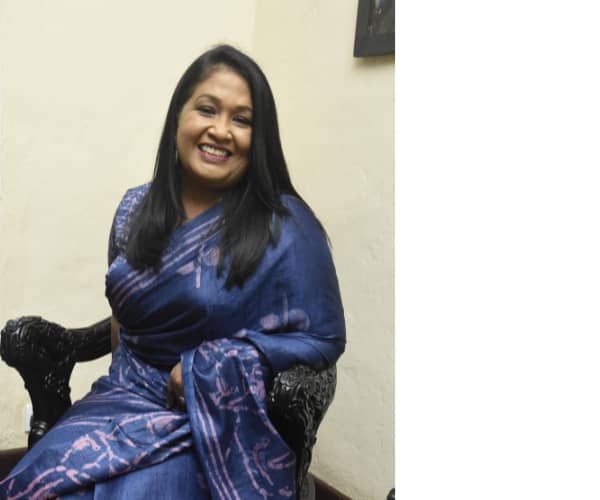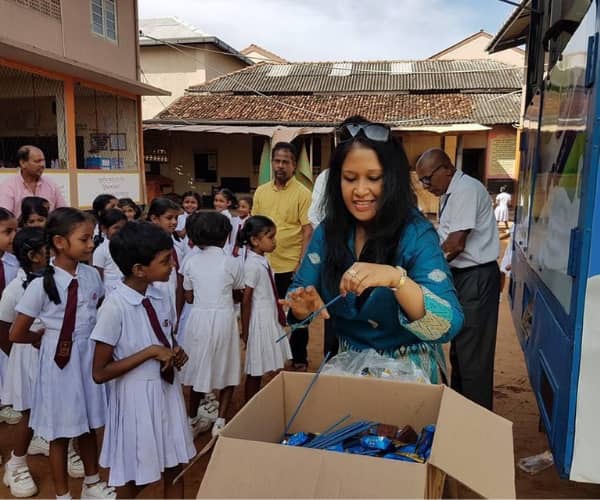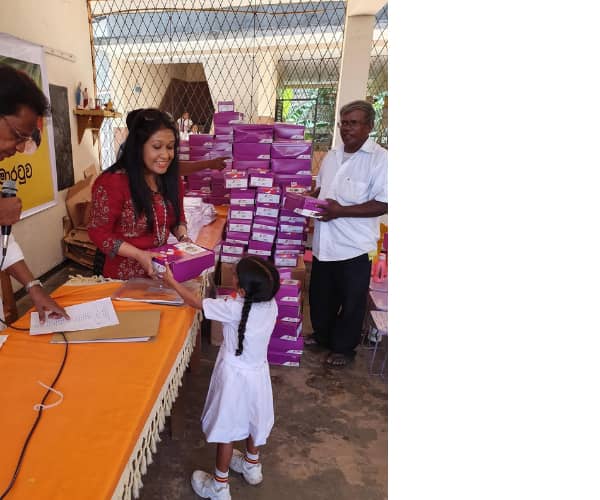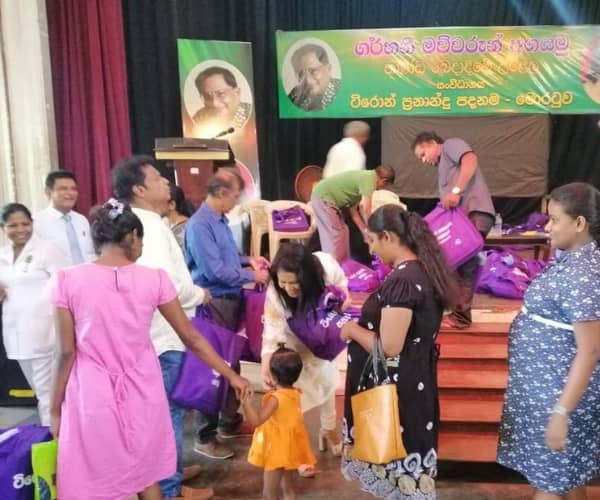
Feb 07 2022.
views 1324Tehani Sharnez Alenka Mathew (née Fernando) received her education at Ladies College, Colombo 7 and went on to do her Bachelor of Arts in Political Science at Columbia University, New York, and her Master of Science in Applied Psychology with Honours at the University of Colombo, Sri Lanka.
A director of many companies, her main commitment now is to the Expo 80 Foundation (Tyronne Fernando Foundation), Moratuwa Sri Lanka, where she is the Chief Trustee. She has held the positions of President Seva Vanitha Movement Ministry of Foreign Affairs, Sri Lanka, Volunteer Counsellor at Women in Need NGO, working on issues related to violence against women and children in Sri Lanka, Volunteer at Sahanaya Community Mental Health Services, Sri Lanka, President Seva Vanitha Movement Ministry of Information and Broadcasting, Sri Lanka, to name just a few. She is also a member of the Rotary Club of Colombo, the Women’s Chamber of Industry and Commerce, Sri Lanka, the Executive Committee of Women in Need, Sri Lanka, and a member of the American Alumni Association of Sri Lanka.

1 Having studied Applied Psychology and Political Science, do you have plans to follow in your father’s footsteps?
People like my father joined politics in the seventies because they had a conviction they could build a better Sri Lanka. I remember him telling me that he felt that he either had to migrate or get into politics to facilitate the changes he wanted to see in the country. He had returned from Oxford University and Grey’s Inn and had a lucrative career in law ahead of him, but he sacrificed it all for an ideal and a vision. Today much has changed. The political landscape we are now living in is vastly different from the one that existed when my father made his entry into politics. Many setbacks have occurred to the victories hard-won in the seventies. Successive Governments have overseen a steady and gradual erosion in norms and institutions. Honest and educated people like my father are reluctant to enter politics and even when they do they are so few in number that they are easily swallowed and do not survive for long in the shark pond. When I ask myself as a citizen of this country the simple question of whether my ideals, values, and belief systems are upheld by our representatives in Parliament the answer is a definite NO. The gradual and steady erosion of norms and institutions has led to increased levels of cynicism and lowered expectations in the minds of the younger generation concerning Governance. So when I am asked the question about following in my father’s footsteps I would say I am reluctant to do so unless there is a sizable population of honest and ethical people who want to enter the political arena to make a difference; a handful of people cannot change the narrative.
2 What, in your opinion, needs to be set in place to rectify the country’s many woes? We seem to be eternally teetering on the edge of disaster.
I believe the spark that stimulated the transition of the seventies can still be ignited if the Government is open to rectifying the crisis of its own making. It is true that tourism, investment, exports, and remittances are all sectors vulnerable to the covid pandemic that have contributed to declining foreign reserves. However, having said that most of our neighboring countries have seen a 20%to 40% increase in foreign reserves while we have seen an 80% decline. Maintaining foreign reserves is vital to the economic health of a country and this is very depressing considering our advantageous geographical location, the belt/road initiative, and our location on the trade route. Frugal and prudent we have not been as a Country. Government monopoly over state institutions, ad hoc short term interventions, misallocation of taxes, salary hikes to the already over-large ever-growing state sector before elections, political instability, large scale corruption, lack of transparency, lack of rule of law, budget manipulations to favor special interest groups, policies not based on economic realities but on political gains and restrictions to economic and civil freedoms have led to this downward spiral. The repercussions of this are a lack of investor confidence and the prediction of the growth rate further slowing down to 2% in 2022 from 3.6% in 2021.
The ban on fertilizer overnight when the country was not ready for organic-based agriculture has seen yields drop across all sectors of tea, rubber, and coconut. No country in the world has made such a transition like this overnight. Even Cuba which switched to organic phased it out over ten years. The alleged violations of human rights may result in our preferential trade status being threatened. All these repercussions of poor management have led to a lack of investor confidence in our external debt obligations and a downgrading of our credit rating by Fitch to CCC. I am not an economist but I read what experts have to say. I can see that the options and solutions are available but one must learn to take them. Investors have confidence in the IMF so we must turn to them for debt restructuring and support and open up multilateral financing in order to make progress. Whatever Government comes into power must operate on a long-term rule-based policy based on a concrete strategy and plan. How long can Sri Lanka depend on neighbouring countries with vested interests to boost us with currency swaps which can only be a temporary solution? Most importantly it is imperative we have educated people in Parliament and the Cabinet. And I say this of all Governments and Parliaments, not just the present one. If we look at the educational qualifications of the Cabinet of Singapore and compare that with ours I don’t need to say anything more. Singapore aspired to be like us in the sixties, now they are so far ahead while we have been left lagging behind.
3 Does Statesmanship exist today in any part of the world?
Although there are many definitions to the word I will go with the one that describes statesmen or women as a “ wise, skillful and respected political leader”. In my opinion, Angela Merkel has demonstrated these qualities on many occasions, most notably in her empathy and moral stature during her handling of the European migrant crisis and her skilled and strategic handling of the Covid pandemic in Germany. Harvard University President Larry Bacow has described her as “ one of the most widely admired and broadly influential states-people of our time”.
4 What do you think are the most important principles to instill in a child?
Honesty and integrity; respect and moral obligation to all sentient beings; learning to forgive; conservation and the ability to handle money wisely and being true to oneself while never worrying about what other people think or have to say. My grandmother the late Chloe De Soysa taught me this when I was still quite young. Having a father in politics from the time I was eight years old meant that I was exposed to a life of limelight because I was very involved with his political and social activities. Needless to say, human nature being the way it is, I was the subject of gossip and chatter in social circles. I now understand that this is just the way people are, but at a young and impressionable age, it was quite terrifying. One day I whined and complained about this to my grandmother and she asked me only one question. “ Are these people your role models”? Of course, they were not and I told her so. “ Then why bother about what they have to say about you ?“ she asked. From that day onwards it has never bothered me as to what people say about me. As long as I am true to myself and my belief system, that is all that matters.
5 What is a parent’s greatest challenge today?
The greatest challenge today is to make the younger generation realize that the subtle push towards conformity poses the greatest danger to humanity. Every generation's mental framework of what is right or wrong is shaped by the collective experience that defines their formative years. It is easy to normalize and rationalize prejudice and inequality when that is all one has known as the norm. If we seek to reform the societies we live in, we must teach the younger generation to recognize the inner worth and dignity of all sentient beings and that evil will thrive if good people do nothing.
6 How involved are you with Expo 80 Moratuwa or the Tyronne Fernando Foundation?
My father started the Foundation in the eighties, with its mission being to help the economic and social welfare of the people of Moratuwa. It is a Parliamentary incorporated charitable trust gazetted by an act of Parliament. Ever since his demise in 2008 I have steered the Foundation as its Chief Trustee for a period of 14 years now. I am very actively involved and blessed to have ten dedicated trustees who work equally hard. However, neither I nor any of the other trustees receive any remuneration from the Foundation. We all work on a voluntary basis.
7 How is it funded?
All these years we operated on our fixed deposit interest income as my father had left money and property in the name of the Foundation. However, it is now getting increasingly difficult with low-interest rates and the escalating demand for relief required by the people of Moratuwa. We have recently started to rely on donations from well-wishers and friends of the Foundation.

8 Apart from yourself who are the other trustees?
Apart from myself, we have ten other trustees as per the provision of the constitution. They are a cross-section of people from Colombo and Moratuwa mostly made up of lawyers, professionals, and businesspeople. The trustees are Lal Peiris ( Secretary), Prof Sharya Scharenguivel, Rasin Seneratne, Hirantha Rodrigo, Indraneela Fernando, Chathuri Ranasinghe, Anujath Fernando, Lankika Perera, Kshenuka Saparamadu, and Lakmimi Wijesundera.
9 Could you briefly tell us the activities of the Foundation
The programmes we have undertaken over the last 14 years are too numerous to count but here are a few: milk and biscuit distribution to Moratuwa schools twice weekly, providing uniform materials and books to school children every year; building toilets and providing building materials and roofing sheets; providing dry rations and rice bags to over ten thousand families every year; providing scholarships and educational help such as laptops, textbooks and paying of tertiary or vocational education fees; providing electrical equipment and utensils for female entrepreneurs engaged in small scale business; helping differently-abled children; Christmas party every year for 800 underprivileged children; sponsorship of deserving individuals and events; helping cancer patients with essentials; conducting free English classes; ongoing program for pregnant mothers for them to receive all the essentials they need to take to the hospital with them. This is done with the corporation of the GMO. The names and the lists are both given by the GMO and the hospital; helping Lunawa hospital; helping children and adults undergoing medical treatment with costs towards medicine or treatment; facilitating educational opportunities and recreational activities to schoolchildren to broaden their outlook and perspective.
For example career guidance workshops, hotel tours and tea sponsored by the Hilton Hotel Colombo and social outings, lunch at the Ministry of Crab, and shopping at Odel sponsored by Dharshan Munidasa; courses conducted to facilitate vocational learning and entrepreneurship in partnership with the Women’s Chamber of Industry and Commerce. For example hairdressing courses, life coaching, and courses for domestic and migrant workers with opportunities to secure overseas employment; providing fishing equipment and bicycles to fishermen; providing tires to three-wheeler drivers; donation of wheelchairs and helping the aged to mention a few.
10. Are your husband and children actively involved in the Foundation and will your children carry on your good work
My husband is a self-made businessman who is also an accountant. He has a very busy work schedule and has absolutely no time to be involved in the activities of the Foundation. He has through his business acumen raised the living standard of everyone who works for him, which is no easy task considering the fact that he has close to 800 employees. However, he has always been very encouraging and supportive. As we have no premises in Moratuwa, we use the Packwell Lanka board room for our monthly meetings. My children are not actively involved either, and whether they will carry on the work of the Foundation will largely depend on their decision to live in Sri Lanka or Australia. Time will tell.
11. Should Social Responsibility be part of a school’s curriculum
Mankind has made vast strides in technological development, artificial intelligence, and machine learning. Increasingly these various technologies have shown to impact levels of social isolation and have alienated human beings from one another. In order to promote personal and collective identity and focus on taking responsibility for one’s own actions on the community and the environment, it is imperative that social responsibility be a part of the school curriculum
12. You have worked as a counselor with Sahanaya and Women In Need - Violence against women and children is on the rise as well as depression and the inability to cope with daily life. In your opinion what is the cause of this surge/increase
Statistics show that there is always a surge of violence against women and children in times of stress, disruption of social and protective networks, emergency situations, times of economic hardship, and during pandemics. More vulnerable groups within this group are women who live in conflict areas, women living with disabilities, and displaced and refugee women. The pandemic has created upheavals in the daily life of people. Isolation, restricted movement, spending time in close proximity, economic and livelihood losses coupled with limited health and protection services are the ideal environment for domestic violence situations. Combine this with a perpetrator's access to alcohol or drugs and the stage is set for a domestic violence scenario. In Sri Lanka, one in five women have experienced violence by a partner. Unfortunately, only 13% of the victims complained( 2019 statistics). I did my Master’s thesis on the subject of learned helplessness factors and gender role orientation in women subjected to domestic violence. Traumatic stress experienced during DV leads to fear and isolation which in turn leads to depression, disassociation, anxiety, and learned helplessness. The victim through repeated uncontrollable stressful situations becomes unable to break away from that situation believing it is not possible and the unfortunate cycle continues.
13. Home and upbringing/environment, versus genes - as a counselor what in your opinion plays a bigger role in shaping people
The nature vs nurture debate is one of the oldest issues in Psychology. When I was studying at Columbia University for my Bachelor of Arts this debate fascinated me. I have now come to realize there is no simple answer to this question. Every day there is new research on this subject in favor of one side or the other. For example, twin studies have shown that identical twins separated at birth had the same traits as twins raised together Thus genetics have played the primary role; whereas other studies have shown foster parents have a greater influence on the personalities of fostered offspring than the genes inherited from birth parents. I believe that some traits are definitely inborn regardless of environmental influence while others are determined by our experience. So the interaction between the two ( genetics and environment) is what influences human behavior, personality, cognitive traits, intelligence, temperament, and psychopathology.
14. How do you manage a work-life balance with all that you do
I am at a point in my life where my children are grown up and do not require my intervention in their daily activities. Plus I live with a workaholic husband who even visits his factory for half a day on a Saturday or poya day if he possibly can. So I like to keep myself busy and occupied. After the demise of my grandmother, I have become more involved in our family businesses which are plantation management and assets and property management along with my aunt Prof Sharya Scharenguivel. We also have two-holiday rentals, one in Nuwara Eliya ( Selwood ) and one in Negombo ( Diklanda estate bungalow managed by Back of Beyond ) which makes the workday an interesting mix. Although the Foundation work can be very time-consuming we all find it extremely rewarding, especially when we see an entrepreneur we have helped, reap the rewards down the track. We keep a tab of these people and follow up on their progress and except for a few failures which are to be expected, most have progressed.
The people whose tertiary education or vocational training have been paid for, are now are having their own hairdressing salons or sewing establishments to name a few. I cannot stress the fact enough, that none of this can be achieved single-handedly. Although the logistical and financial matters are mainly handled by me, all the adverse and tough groundwork at the grassroots is done by the other trustees with much dedication and commitment. Throughout the pandemic and during the lockdowns we continued our dry ration distributions because we knew people were starving, and it is the trustees who were out there, despite the threat to their own lives, to whom all kudos is owing.
The Foundation secretary Lal Peiris had been involved in politics from the age of eighteen with my father and is knowledgeable about every square inch of Moratuwa which is a huge plus point. So while my days are busy I would not say they are overwhelming. When I first inherited the Foundation so to speak, I was actually not overly excited about it. I saw the road ahead of me filled with obstacles and annoyances in trying to do this kind of work. But now after 14 years, I see it as the best thing that happened to me. If ever I get frustrated I remind myself always of a quote by Elizabeth Goudge in the White Witch “ We all of us need to be toppled off the throne of self my dear” he said. “perched up there, the tears of others are never upon our own cheek”.

15. Your grandmother Chloe de Soyza was an iconic figure. How has she influenced you and what you do
My grandmother Chloe De Soysa was an amazingly strong and dynamic force and she was and always will be my one and only role model. She had boundless energy, a very positive outlook on life, an indomitable spirit, a tireless work ethic, and a dress sense that was uniquely her own. I count it a privilege to have been brought up by her from the age of 14. I can write a thesis on her achievements as the Founder President of the Women’s Chamber of Industry and Commerce, her creative career as the designer and owner of Mariposa, and so on but since this is a specific question on how she influenced me I will stick to the point. As an impressionable teenager who always wanted the good things in life without wanting to work very hard in order to achieve them, she used to impress upon me over and over again that a good work ethic combined with never living above your means is the key to survival.
She used to stress upon me that I needed to maintain the same standard of living every day of my life. What she meant by this is not to live in the Ritz for a few days and then move onto the streets. I hated these words of wisdom and thought she was a total party pooper ( my terminology of the time). Older and wiser and with children of my own I came to appreciate her wisdom, especially when I could see many who I foolishly had wished to emulate, who had lived at the Ritz, moving onto the streets. Another important lesson she taught me was that those who gossip with you will gossip about you. She detested idle chit chatter and her conversations were always centered on interesting topics, foremost among them Politics.
My love of art, interior decor, theatre, traveling, entertaining, and creativity are all influenced by her. I think part of my aversion to active Politics can also be attributed to her words of advice to me. She was really fond of my father Tyronne although he was her ex-son-in-law in the true sense of the word. But she always said, “he is my son-in-law, I did not divorce him”. But she was always horrified that he had sold so many of his family properties to survive in Politics for over 30 years. For if you are an honest politician that is what you have to do. You spend your own money. This is why I say we need a system change. How can honest and educated people survive in politics without becoming impoverished themselves?
She used to impress upon me that whatever one inherits through family must always be passed onto the next generation. She was very proud that she had retained what she inherited and passed it down to her family. The family was everything to her and she loved and defended us with all our flaws and faults. To this day, even though she is no more my brain is now wired to think and feel the same way. Spend what you earn but pass down what you inherit through the family to the next generation. She had a wonderful, companionable relationship with my grandfather Cecil and to this date, I have not seen such a compatible and happy marriage as theirs. They were polar opposites in personality but shared the same interests and were devoted to each other. She used to tell me “ never marry the man you can do with; marry the man you can’t do without”.
Having come from a broken family, my grandparent's marriage was an example to me as something to strive for and emulate in my own marriage. I suppose after 30 years I can say I have been somewhat successful. Even though I can say realms more about her I will end by saying she was also a woman of great faith and spirituality and always found great joy in the simple things of life. Now when I go to Nuwara Eliya there is no one to pester me to take walks twice a day or come rushing into my room to open the curtains in the morning so sunlight and fresh air could come into the room( all things that I used to hate growing up ). I miss those little things and wish I had appreciated them more. So though she is no more she was my greatest cheerleader while she was alive, and I know she is watching from somewhere and still cheering me on.

16. What would you want your legacy to be?
I don’t really believe in legacies. I believe unless one is a Hitler or a Mother Theresa or an Alexander Fleming to name a few, most of us will just live on in the minds of people for a generation or two. But while I am alive I do want to tread gently on this Earth and minimize my carbon footprint on this planet. On a visit to the Hubbard Glacier in Alaska the stark reality of how we are destroying this planet struck me. Above all, I want to be kind to people without the expectation of reward or recognition. For when I do meet my creator one day I need to be accountable for the life I have led on this earth
Text Anusha David
Main pic Nimalsiri Edirisinghe
0 Comments